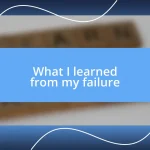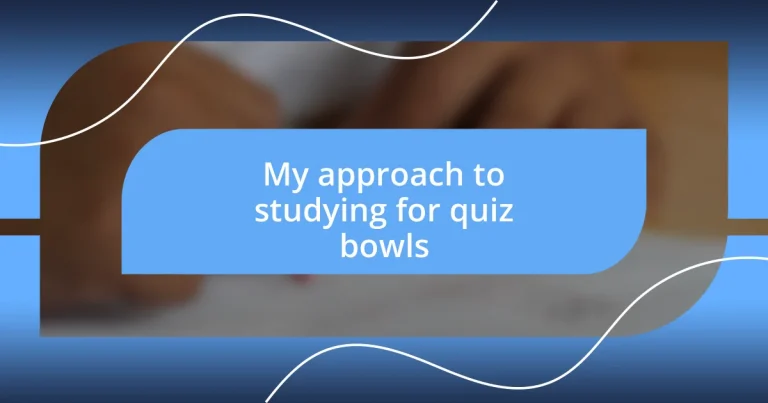Key takeaways:
- Engaging in quiz bowl formats enhances both quick-thinking skills and team collaboration, highlighting the importance of both speed and partnership.
- Identifying key study materials, such as quiz packets, flashcards, and online resources, is essential for comprehensive preparation and effective learning strategies.
- Evaluating knowledge gaps through self-assessment and seeking external feedback can significantly improve quiz performance and understanding.
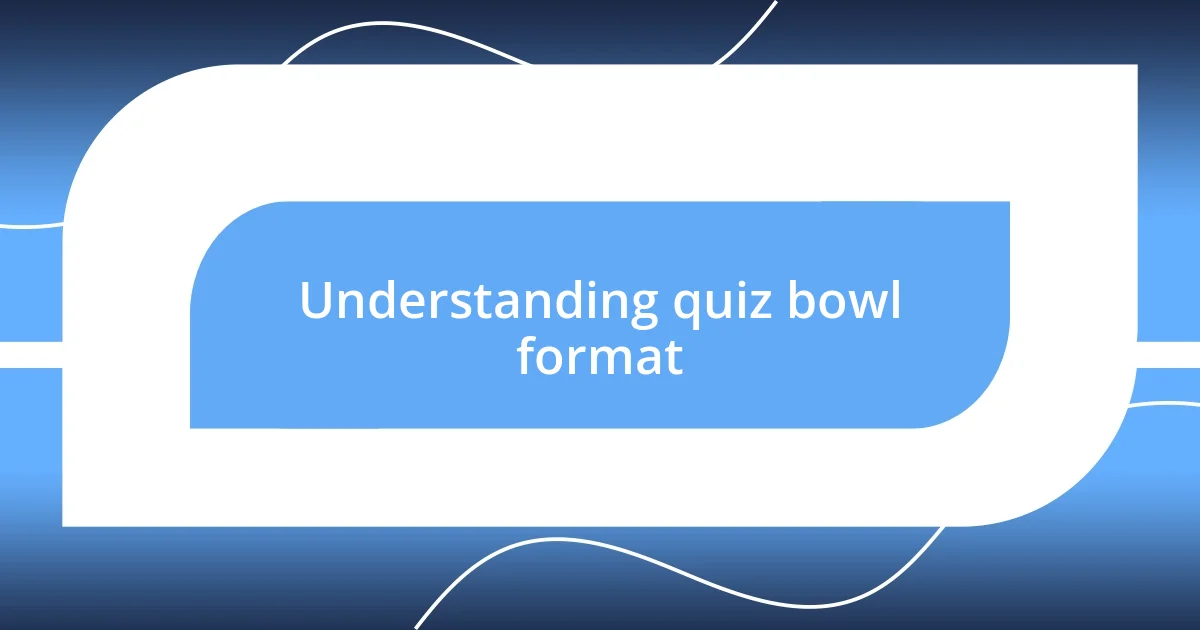
Understanding quiz bowl format
Understanding quiz bowl format goes beyond just knowing the rules; it’s about engaging with the excitement of a team challenge. I remember my first quiz bowl—my heart raced as the moderator read the questions. The fast pace of answering and the camaraderie shared with teammates created an electric atmosphere.
Typically, quiz bowl formats consist of timed rounds with both toss-up and bonus questions. Toss-ups are like lightning strikes—whoever knows the answer buzzes in, but let me tell you, the pressure of raising your hand while your mind races can be exhilarating! Have you ever felt that mix of adrenaline and anticipation? It’s a unique experience that teaches you to think quickly and act decisively.
Bonus questions provide a chance for teams to showcase deeper knowledge. They build collaboration and strategy, as teammates confer on their answers. I often found myself counting on my partner’s expertise during these moments, which strengthened our bond. Isn’t it fascinating how the format not only tests facts but also teamwork?
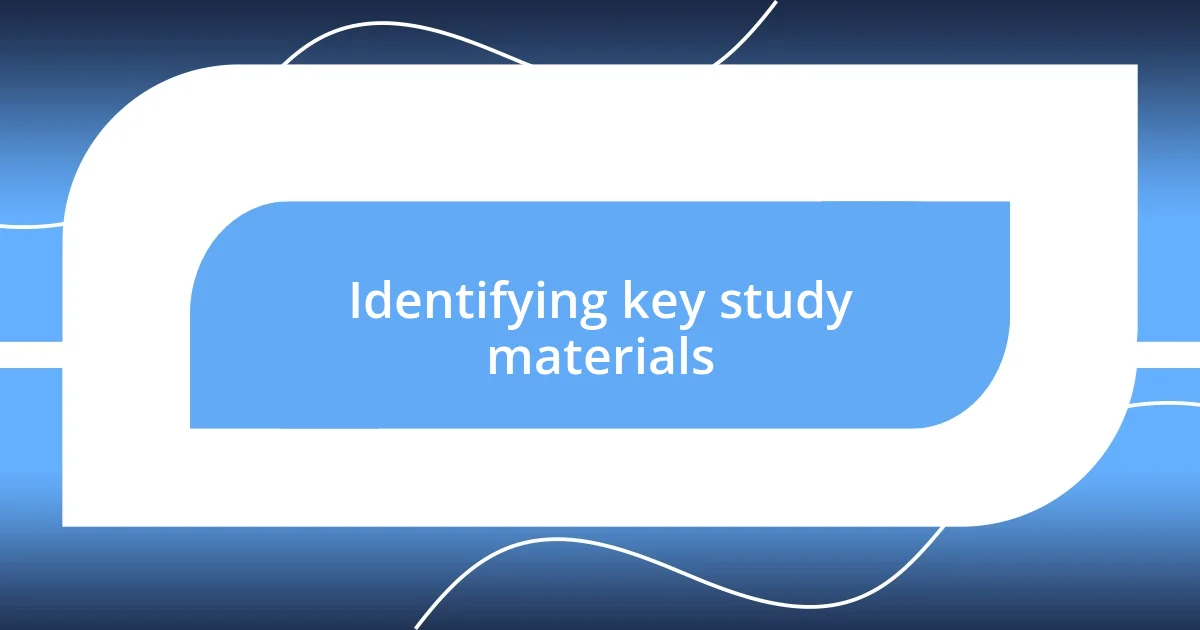
Identifying key study materials
Identifying key study materials is crucial for anyone serious about quiz bowls. Over the years, I’ve discovered a treasure trove of resources that enhance my preparing process. I still remember the time when I stumbled upon a fantastic YouTube channel dedicated to quiz bowl content. Watching past tournaments and expert analysis not only sharpened my trivia skills but also gave me a peek into the strategies of successful players. It was like having a behind-the-scenes pass to the quiz bowl world.
Here are some essential study materials that I find invaluable:
– Quiz bowl packets: These often include questions from previous tournaments and are a great way to practice.
– Flashcards: Creating them for important topics has vastly improved my retention.
– Books and encyclopedias: While I prefer specific topics, keeping a well-rounded knowledge base can be game-changing.
– Online databases: Resources like ACF and NAQT provide a wealth of questions for practice and insight into what tends to be asked.
– Study groups: Collaborating with others not only helps you cover more ground but also allows for discussion and deeper understanding of challenging subjects.
Each study material guides the way, shaping a more confident and well-prepared quiz bowler.
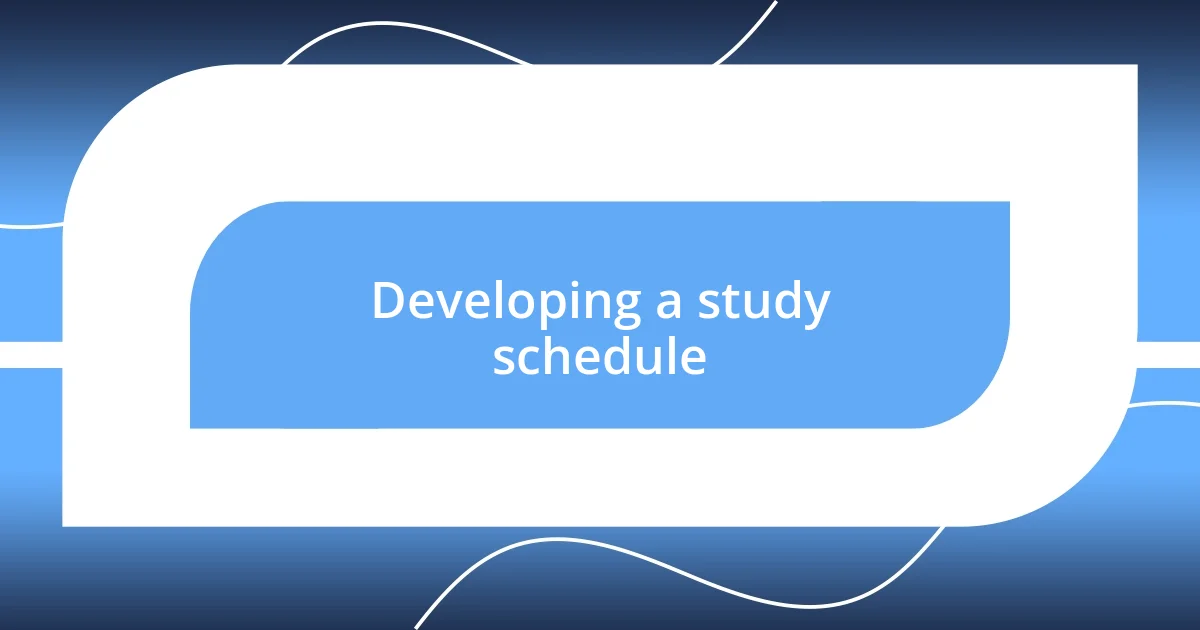
Developing a study schedule
Developing a study schedule is essential to staying organized and motivated. I remember creating my first schedule in high school—it felt like a game changer. By breaking my study sessions into manageable chunks, I could tackle one topic at a time without feeling overwhelmed. Scheduling not only optimizes my time but also holds me accountable, keeping procrastination at bay. Have you ever felt the relief of ticking off completed tasks? It’s incredibly satisfying.
Time blocks are my secret weapon. For instance, I usually devote Mondays to literature and Tuesdays to history. This helps me retain focus and creates a rhythm to my learning. I’ve found that mixing short, focused study sessions with brief breaks boosts my productivity. For example, after a solid 30 minutes of studying, I take a 5-minute break to recharge. Trust me; that little escape makes all the difference!
Here’s a quick comparison of different study schedules I’ve found helpful:
| Type of Schedule | Description |
|---|---|
| Fixed Schedule | Consistent subjects on specific days, ideal for creating a routine. |
| Flexible Schedule | Adjustable daily topics based on progress or interest, promoting spontaneity. |
| Mixed Schedule | Combination of fixed and flexible elements, allowing structure while accommodating changes. |
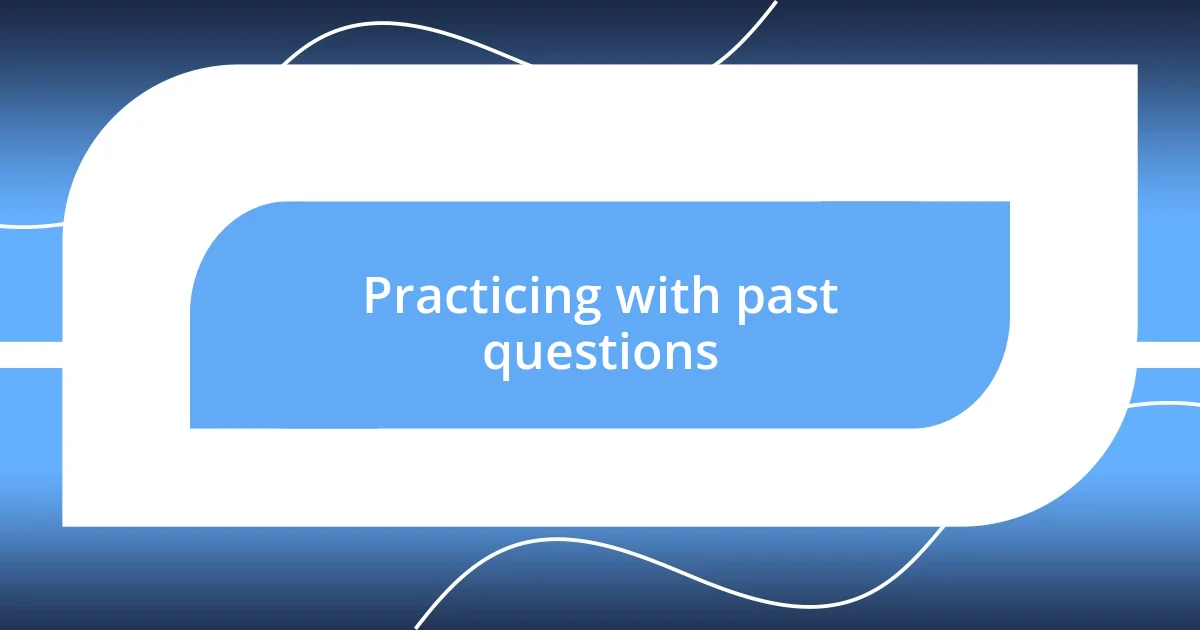
Practicing with past questions
Practicing with past questions has been a game-changer for me in quiz bowl preparation. I remember the first time I sat down with a stack of old questions; it was like stepping into the quiz bowl arena without the stress of competition. These questions not only familiarized me with the format but also revealed the kinds of topics that often come up. Have you ever been surprised by the frequency of certain themes? I certainly was!
One of my favorite techniques is to time myself while answering past questions. The clock adds an exciting layer of pressure that simulates the actual quiz bowl setting. Initially, I was overwhelmed, frequently running out of time. However, this practice sharpened my quick-thinking skills. It’s fascinating how replicating these conditions can lead to noticeable improvement in performance. Have you noticed how adrenaline can boost focus?
I also like to analyze my performance afterward, noting which areas I struggled with and celebrating my strengths. I could feel the incremental growth each time I reviewed my answers, and it motivated me to dive deeper into the subjects where I fell short. Reflecting on these practices, I genuinely believe there’s immense value in learning from past experiences—both my own and those represented by past questions.
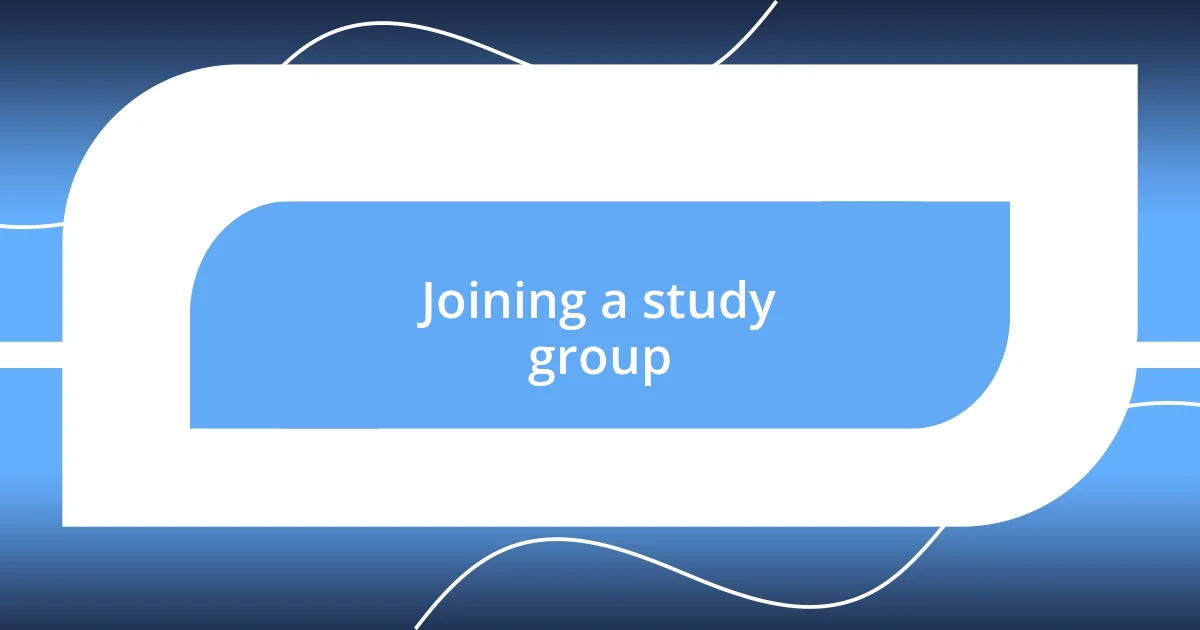
Joining a study group
Joining a study group has been one of the most rewarding decisions in my quiz bowl journey. I recall the first time I collaborated with my peers; it felt like being part of a supportive team rather than studying alone. The energy in the room was palpable, with everyone sharing fun facts and competing to answer questions first. Isn’t it interesting how much more motivated you feel when others are there to encourage and challenge you?
During our group sessions, we would often quiz each other on different topics. I vividly remember one session where we focused solely on science trivia. We turned it into a friendly competition, complete with little prizes for the winners. Not only did that make learning more enjoyable, but it also helped solidify the material in my mind. Have you ever experienced the thrill of learning through play? It truly sticks with you in a way that traditional studying sometimes doesn’t.
There’s also something special about having a diverse group with varying strengths. For instance, I’m more inclined towards literature, while one of my friends has an incredible memory for historical dates. This blending of talents means we learn from one another, filling in gaps that we may overlook on our own. It’s a wonderful reminder of how collaboration can enhance our individual study experiences.
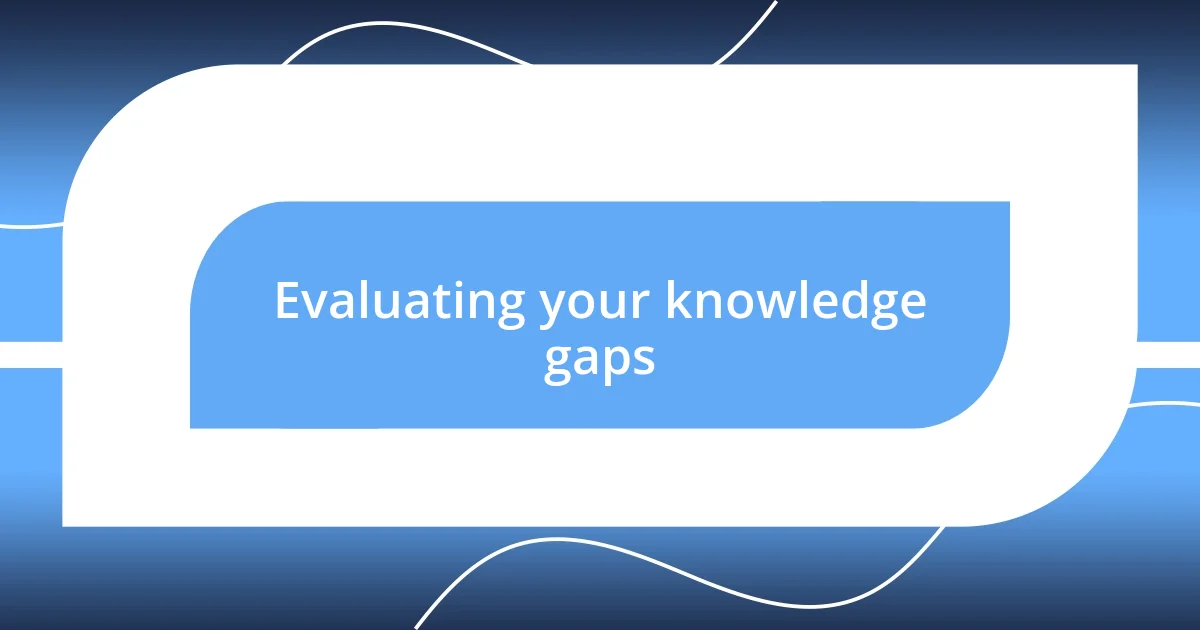
Evaluating your knowledge gaps
When it comes to evaluating knowledge gaps, a candid self-assessment is crucial. I remember sitting down one evening, armed with a notebook, ready to tackle my weaknesses. I jotted down subjects I thought I had a handle on, but when I tested myself, I was shocked by how little I really knew. Is there a specific topic you’ve discovered you struggle with, despite feeling confident? Identifying those areas is the first step toward improvement.
Reflecting on past quiz bowl experiences can also illuminate what I’m missing. One time, I completely froze on a question about classical literature—a subject I usually enjoy! It struck me afterward how much I’d taken for granted my existing knowledge in other areas. Have you ever faced a moment of unexpected panic during a quiz, only to realize later that it was an opportunity for growth? That realization fueled my desire to explore my misconceptions and fill in those gaps.
Another strategy I’ve found useful is reaching out to friends for their input. Not too long ago, a fellow participant suggested that I take a short quiz to pinpoint where I faltered. The results were revealing! Engaging external feedback can shine a light on blind spots that I might miss during solo study sessions. How do you go about seeking insights from others? That simple act can be a game-changer in assessing comprehension and readiness.
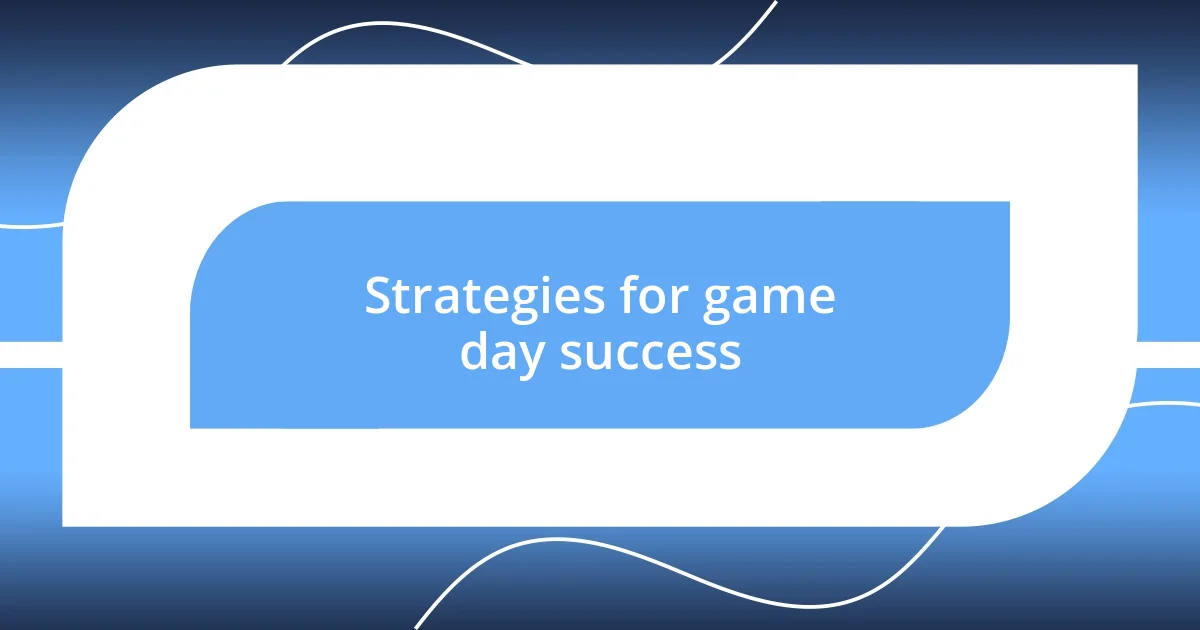
Strategies for game day success
Think about your game day routine. I’ve learned that starting my day with a solid breakfast sets the tone for success. On one particularly nerve-wracking quiz bowl day, I skipped it, hoping to get more studying in. I quickly realized that my concentration faded long before the first round. Isn’t it funny how something as simple as fuel for your body can impact your performance so dramatically?
Alongside a good meal, hydration is key. I can’t stress enough the importance of keeping water nearby. During one competition, I remember feeling parched right before a crucial round. It distracted me completely, making me hesitant to buzz in when I knew the answer. Have you ever been in a situation where thirst clouded your quick-thinking abilities? Staying hydrated helps me maintain focus and sharpness, keeping my mind as agile as I need it to be.
Lastly, mental rehearsal plays a significant part in my pre-game strategy. I often close my eyes, envisioning the challenges I’ll face and how I would respond. One time, I imagined myself navigating through tough questions effortlessly, and when they came up in actual play, it felt familiar. Have you ever practiced in your mind only to find it made the real thing easier? This mental preparation allows me to approach the game with a confidence that can make all the difference.


